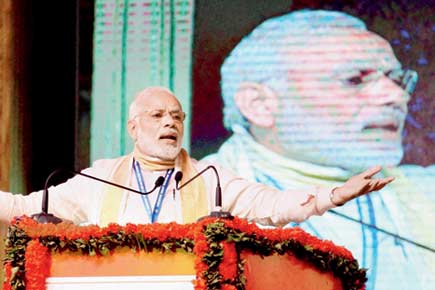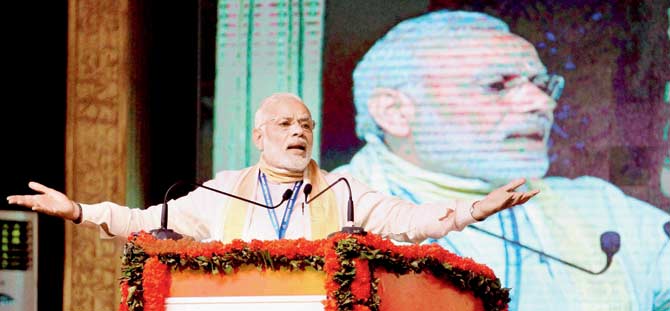In a new book, authors examine ‘non-violent compellence’ and lay out a menu that can help India work out its response to Pakistan


PM Narendra Modi addresses the BJP’s National Council meeting at Kozhikode on Sunday. Pic/PTI
ADVERTISEMENT
 Every now and then, a book appears so well timed that you wonder how the authors managed it. George Perkovich and Toby Dalton’s Not War, Not Peace: Motivating Pakistan to Prevent Cross-Border Terrorism is one of them. The book, which was released in Delhi last night, takes up the theme that has roiled the country for the past ten days — how do we persuade Pakistan to abandon its support to terrorism?
Every now and then, a book appears so well timed that you wonder how the authors managed it. George Perkovich and Toby Dalton’s Not War, Not Peace: Motivating Pakistan to Prevent Cross-Border Terrorism is one of them. The book, which was released in Delhi last night, takes up the theme that has roiled the country for the past ten days — how do we persuade Pakistan to abandon its support to terrorism?
The central theme of the book is that the existence of “survivable” nuclear arsenals by India and Pakistan make any conventional war “suicidal as a means resolve the disputes that bedevil their bilateral relations.”
The authors are associated with the Carnegie Endowment for International Peace, and Perkovich is the author of a seminal study on India’s nuclear weapons capability. The book is a classic US think tank project, a product of rigorous scholarship and analysis, based on scores of interviews conducted by the authors in both countries. Its arguments are laid out quite bluntly and the authors say they are not recommending any specific course of action, only laying out a menu which can help India to work out its response. For that reason it must be taken seriously — very, very seriously.
The book has systematically examined the policy and decision-making background and then studied the options individually. So they look at army-centric responses associated with the proactive or “Cold Start” doctrine; the option of air power, which many today claim would be the least escalatory, covert action, and the manner in which nuclear weapons are factored into the equation. Finally, they examine the issue of “non-violent compellence”.
“Compellence” is a peculiar nuclear-era concept which goes beyond deterrence, because deterrence is preventing the adversary from doing something, whereas compellence is a mix of policies, postures and capabilities which seek to push the adversary towards a desired direction, such as, say, abandoning support for terrorists. What the authors do is look at its elements like sanctions, diplomatic isolation, financial punishment and even naval blockades as a means to pushing Pakistan to do the needful. The authors argue that India’s growing clout in world affairs can enable it to undertake a strategy of “non violent compellence”.
We are perhaps detecting elements of the last strategy in Modi government’s dealings with Pakistan. The Modi strategy — cornering Pakistan across the world, his addresses to the US Congress, BRICS leaders meeting in Guangzhou, the G20 summit and, indeed, wherever he has gone in the last six months. His refrain has been constant — Pakistan is a rogue state which needs to be isolated.
Modi’s reference to Baloch, Gilgit-Baltistan and Pakhtunistan indicate that playing around with Pakistani faultlines may be part of the strategy.
Parallel to this have been the revival of Indian diplomatic efforts to promote a Comprehensive Convention on International Terrorism (CCIT) and to push with the need to colar people designated by the Al Qaeda-Taliban sanctions committee.
Perkovich and Dalton have referred to the UN Security Council Resolution (UNSCR) 1373, a Chapter VII resolution banning funding of terrorism and calling on states not to support terrorism. But there are a clutch of other resolutions like 1566 of 2004, also under Chapter VII, calling on states to “find, deny safe haven and bring to justice” all people involved in financing planning or commissioning terrorist acts.
There has been talk of things like naval blockades and scrapping the Indus Waters Treaty. It does not take too much to say that these are not easy options. A blockade minus war goes against international law, and in addition, not workable unless China and the US are on board. As for IWT, denying water is not a feasible option. It also opens up India to similar action by Nepal or China.
Non-violent compellence is hazily understood and applied by Indian policy makers for the past 30 years with indifferent results. The reason for this is the lack of analytical rigour in working out and applying policies in general in the country. India tends towards ad hoc and instinctive approaches. As spelt out by the authors, and as hinted by Modi, a more systematic application could come up with different results. It could involve an offensive on multiple fronts aimed at isolating and punishing Pakistan through sanctions. People say that sanctions don’t work, but in the case of Iran recently, they certainly did. The issue is the manner in which they are brought about. The world is currently in a funk over the rise of Islamist radicalism; this could be a good opportunity to revisit the issue.
In this context, one of our greatest failings has been in our inability to break what we call the ‘Sino-Pak nexus’. This has been around since the mid-1960s, yet New Delhi has not worked out a strategy through which we could break or at least moderate this nexus. It is not as though the lines of policy to do this are not visible, as have been the opportunities.
The writer is a Distinguished Fellow, Observer Research Foundation, New Delhi. Send your feedback to mailbag@mid-day.com
 Subscribe today by clicking the link and stay updated with the latest news!" Click here!
Subscribe today by clicking the link and stay updated with the latest news!" Click here!






